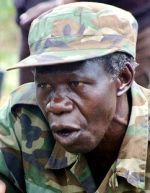Uganda turns down rebel calls for dissolution of army
July 17, 2006 (JUBA) — The rebel Ugandan Lord’s Resistance Army (LRA) has demanded the dissolution of the national army at peace talks to halt nearly two decades of fighting, but the government flatly refused the call and instead demanded the insurgents give up all their weapons.
 The LRA position paper, presented to southern Sudan mediators at talks here aimed at ending a 19-year-old insurgency in northern Uganda, said there was an urgent need of “reorganising of the army and other forces” as well as the signing of a comprehensive ceasefire agreement with the government.
The LRA position paper, presented to southern Sudan mediators at talks here aimed at ending a 19-year-old insurgency in northern Uganda, said there was an urgent need of “reorganising of the army and other forces” as well as the signing of a comprehensive ceasefire agreement with the government.
“The present army, the Uganda People Defence Forces (UPDF), does not reflect a national character. It is ethnic, partisan and pledges its loyalty to President Yoweri Museveni personally and not to the nation,” said the rebel position paper, obtained by AFP.
“We demand its total disbandment so that an internationally supervised recruitment is done taking into account regional balance and integration of those in the LRA and other armed oppositions who have the qualification or are trainable and wish to join the army,” it added.
In addition, the insurgents demanded the disbandment of camps in northern Uganda housing around two million people, respect for human dignity, protection of their land and compensation from the government, the document indicated.
Mediators said the stance on the national army was the most controversial among a series of other rebel demands.
But government spokesman Paddy Ankunda said Kampala had flatly rejected the rebels’ demands, on a day when both sides adopted the agenda of the talks and agreed to start discussing cessation of hostilities late on Tuesday.
“We told them that this was not possible because there is a constitution that puts in place such institutions. You cannot not merely go and meet a delegation in Juba and decide on that. You have to go to parliament and it changes some laws … we hope they will not push it further,” Ankunda told AFP.
“The talks are progressing well and today we adopted the agenda for the talks. Tomorrow we are going to discuss the cessation of hostilities and each party is expected to present a paper outlining how this cessation of hostilities should be like,” Ankunda added.
In its position paper, the government demanded the LRA cease all forms of “terrorism” and start demobilising, reminding the insurgents that the amnesty offer was on the table.
“The Ugandan government demands the LRA cease all forms of hostilities, dissolve itself and hand over all arms and ammunitions in its possession together with their inventory and assemble in agreed locations where they will be demobilized, disarmed and documented,” it said in the position paper, which lays down the basis for negotiations.
In Nairobi, Sudan Vice President leader Salva Kiir expressed optimism that the peace talks would succeed despite a rocky start when the parley briefly snagged at the weekend.
The hitch came after Kampala’s team complained and threatened to walk out because the LRA warned in its opening statement on Friday of new violence should its grievances not be addressed.
At the same time, Kiir, also the vice president of the semi-autonomous region of southern Sudan, warned that failure would likely lead to fighting between the LRA and his forces in south Sudan, where large numbers of rebels have been driven from northern Uganda by Kampala’s army.
“We have talked to both parties and they have committed themselves to negotiating in good faith,” Kiir told reporters in the Kenyan capital Nairobi, where he was en route to Washington for talks with US officials.
“We are expecting a peaceful solution to the conflict at the end of the period that was … given,” he said, referring to a September 12 deadline laid down for an agreement by Museveni.
Tens of thousands of people have been killed and some two million displaced in northern Uganda since the LRA took leadership of a regional rebellion among the Acholi ethnic minority in 1988 in a bid to oust Museveni and replace his regime with one based on the Ten Commandments.
The talks in the southern Sudan capital of Juba are seen by many as the best chance to end the war, which is regularly described by aid agencies as one of the world’s worst and most forgotten humanitarian crises.
(ST)
